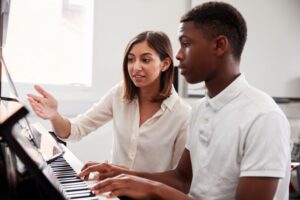It’s never too late to start learning an instrument. I truly believe that statement and I admire adults who call me when they want to finally follow through with their life long dreams of playing piano, guitar, violin, or whatever else. Any age is a good age for music but I think children, especially young children as early as 4, have an advantage. This Article outlines why Private Music Lessons are right for them.
Get Private Music Lessons Early If You Can

Kids should get exposed to music as early as possible (preferably after potty training!) One on one music instructions for children starting as young as 4 years old have obvious musical benefits but also less obvious non-musical benefits. 7 non-musical reasons why kids should start music lessons young:
- Hand-eye coordination- All instruments require hand-eye coordination. On piano, they are playing 2 different lines with both hands. Piano is probably the easiest instrument to learn for a student with poor hand-eye coordination and it can improve those skills dramatically!
- Problem solving- A student plays a note incorrectly and a good teacher will ask the student to figure it out. Those moments that the young student is looking at the music and at their hand and back at the music, counting the lines to figure out the note and then applying to their hand; those moments are where I feel like I’m witnessing their brain grow. I think those moments alone are why a student should be in lessons even when parents know that they probably won’t be professional musicians. Being forced to problem solve within the structure of a fun activity is the best way for kids.
- Helps learning to read- Read music, of course. But also, it helps with reading words! I’ve taught little ones who haven’t really mastered the alphabet yet and its amazing to see how much improvement within lessons the kids make on identifying note names on the piano or on the staff, let alone basic letter recognition.
- Helps learning numbers- Numbers are everywhere in music, just like letters. When a student has a number recognition weakness, it’s improved quickly with consistent lessons because everything depends on the student being able to count notes and rhythm and much more.
- Gets used to having homework- It’s a good idea to get children used to the idea of homework while it’s still considered “fun” work.
- Recital experience- Performing in front of people is nerve-wracking and scary and vulnerable and making kids get that experience early on could possibly help make it less scary and more normal as they grow up. If performing for an audience is something you can work through and overcome young, imagine how much less stressful class presentations, college auditions, & job interviews could be.
- Forming good habits young- Musical and non-musical. Musical habits like muscle memory with hand/body positions is crucial and often the least fun part of lessons. If a student’s position looks wrong, the teacher HAS to fix it, and that is tedious and boring, but we can’t just let that go. If a student nails that down early on, lessons are so much more enjoyable for the student because the teacher isn’t constantly barking about fixing physical things. Non-musical habits like remembering assignments and responsibility of learning songs while the teacher is gone are obviously things that will benefit them in the long run.